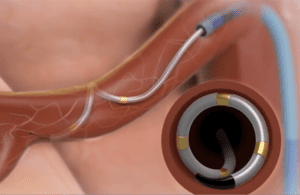
Medtronic faced tough questions about its Symplicity Spyral renal denervation (RDN) therapy for hypertension at today’s FDA review panel.
Medtronic is seeking approval of its Symplicity Spyral multi-electrode RDN catheter and Symplicity G3 radiofrequency generator “for the reduction of blood pressure in patients with uncontrolled hypertension despite the use of anti-hypertensive medications or in patients in whom blood pressure lowering therapy is poorly tolerated.”
The stakes are high for Medtronic, which has been developing the technology for years in the belief that it could be a billion-dollar business and provide relief to millions of patients worldwide, reducing heart attacks, strokes and other serious events tied to high blood pressure.
The same FDA review panel yesterday supported the approval of competing RDN technology developed by Otsuka Medical Devices’ ReCor Medical. If the FDA agrees with the panel’s recommendation on the safety and efficacy of ReCor’s system, it could be the first RDN therapy to be approved for use in the U.S.
But ReCor’s clinical trial met its primary endpoint for efficacy, while Medtronic’s RDN trials have failed to hit that target — though analysts have said they don’t think that will prevent Medtronic from winning FDA approval.
More than 1 billion people suffer from hypertension globally, but only around 40% are receiving active treatment. Of those, around one-fifth report feeling like their symptoms are under control.
Medtronic has said its Symplicity Spyral RDN reduces blood pressure by around 5-10 mm Hg, and that a reduction of just 2-5% mm Hg can reduce cardiovascular events by 10%.